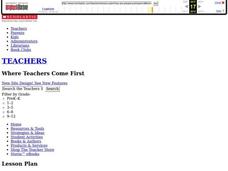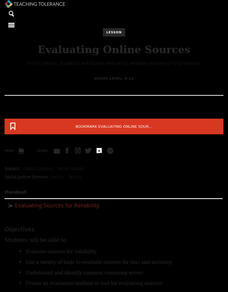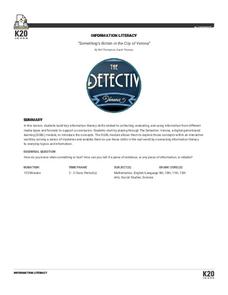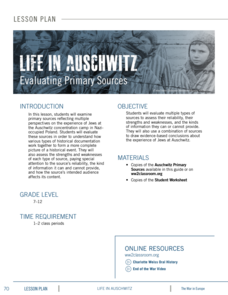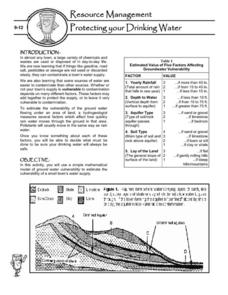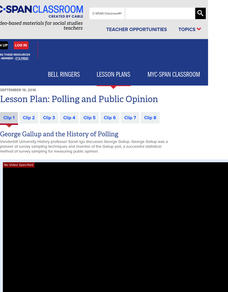Curated OER
How are People Portrayed by Different Media?
Your 9th - 12th graders can hone their analysis and critical thinking skills by studying the way a subject is portrayed across media types. They examine how various print, visual, and online sources have portrayed key players in the 9/11...
Curriculum Development Institute
Impact of Cultural Revolution
What is the role of primary and secondary sources in the study of history? How reliable are these different sources? As part of a study of the Chinese Cultural Revolution, class members examine a variety of resources and evaluate their...
Teaching Tolerance
Understanding and Evaluating Online Searches
With billions of options to choose from, how can people determine which online sources are reliable? Using an informative resource, pupils first discuss and evaluate a sample search result handout. Next, partners create a checklist for...
Teaching Tolerance
Evaluating Online Sources
Newspapers, television, social media ... how do people get their news? Using the informative resource, scholars locate and verify credible sources of information. Working in small groups, they discuss strategies for evaluating the...
Advocates for Human Rights
Nativism and Myths about Immigrants
Where do anti-immigrants myths come from, and how can they be refuted? Learners critically analyze media reports and how to identify reliable sources. After studying a timeline that details the history of US nativism, groups research the...
Pulitzer Center
The Paradise Papers: A Lesson in Investigative Journalism
The Paradise Papers, a year-long research project from the International Consortium of Investigative Journalism (ICIJ) exposed how political leaders, business people, and wealthy individuals used offshore entities to avoid taxes and hide...
Stanford University
What Is History?
Five important tenets of any social studies class are available for young historians with a poster that defines history as an account of the past. It encourages learners to question reliability of an author's perspective, as well as to...
Southern Poverty Law Center
Analyzing How Words Communicate Bias
Words are powerful ... can your class choose them wisely? Scholars evaluate news articles to discover the concepts of tone, charge, and bias during a media literacy instructional activity. The resource focuses on recognizing implicit...
University of Washington
Connecting Youth to Quality Health Information
Many teenagers don't have adequate access to health and nutrition information beyond a quick Internet search. Guide them into health advocacy and proficiency with a lesson focused on MedlinePlus as a reliable source for health...
Columbus City Schools
What’s Up with Matter?
Take a "conservative" approach to planning your next unit on mass and matter! What better way to answer "But where did the gas go?" than with a lab designed to promote good report writing, research skills, and detailed observation. The...
National Endowment for the Humanities
Revolution '67, Lesson 2: What Happened in July 1967? How Do We Know?
Even in a world in which dozens of participants and curious onlookers record every controversial event, the basic facts of what happened are often in dispute. Revolution '67, Lesson 2 explores 1967 Newark, New Jersey using an examination...
Curated OER
Thinking About Hate
This lesson starts out with a guided discussion about the statement "Birds fly in the sky; airplanes fly in the sky; therefore, airplanes are birds" and goes on to cover logical fallacies and reliable sources, relating these to the topic...
Curated OER
Measuring Crime and Fear of Crime
Have your learners delve into the realm of crime statistics using this resource. They use data to answer a series of questions about crime in Britain.
Curated OER
Fast Food and Daily Nutrition Choices
Students explore food. In this nutrition instructional activity, students investigate multiple facets of healthy eating and how the fast food industry impacts our society. They will participate in class discussions, read from their...
Nemours KidsHealth
Media Literacy and Health: Grades 6-8
Internet suffers could drown in the volume of information available on line. Here's an activity that can be a lifeline and buoy confidence in middle schoolers' ability to find reliable information and credible sources. After reading...
K20 LEARN
Something's Rotten In The City Of Verona: Information Literacy
Data is a powerful tool that your class can use for both good and evil! Help your classes become knowledgeable consumers of information through a game-based exploration. Learners examine a method of determining the reliability of a...
National WWII Museum
Life in Auschwitz: Evaluating Primary Sources
Historians explain what happened during the Holocaust, but only primary sources portray the true horror of places such as Auschwitz. Using accounts from those who survived the camps, as well as a Nazi government official's memoirs, class...
Transforming Education
Trauma-Informed SEL Toolkit
The Trauma-Informed SEL Toolkit is a presentation for educators who seek to create a reliable environment where scholars who have experienced adversities and trauma feel supported, safe, and ready to learn.
K20 LEARN
Street Cred: Evaluating Sources
A lesson on evaluating sources of information teaches scholars to "think twice" before using a source. Researchers examine a resource's home page, author, and sponsor, as well as the date published and the documentation provided.
University of Wisconsin
Designing a Rain Garden
Now it's time for all of the data collected in previous lessons to be applied to the design of a rain garden. This resource can only be used as part of the greater whole, since learners will need to rely on gathered knowledge in order to...
US Environmental Protection Agency
Protecting Your Drinking Water
Having a clean, reliable source of drinking water is essential for any community, but in many cases this is easier said than done. Engage young environmentalists in exploring the five factors affecting vulnerability of a groundwater...
C-SPAN
Polling and Public Opinion
Polls are ubiquitous in American politics, but just how reliable and equal are they? A video-driven resource helps learners discuss the question by examining what pollsters and pundits say. Extension activities involve evaluating the...
US House of Representatives
House History Comes Alive
New ReviewHow reliable is oral history? The resource uses the oral history website to help academics understand the pros and cons of using recollections to teach others. Scholars complete a worksheet, draft a letter to a representative, and...
Teach Engineering
Exploring the Forces of Tension
Let the resource stretch the minds of your young scientists with a lesson about tensile strength and stiffness of materials. Groups consider how easily materials stretch and relate this property to engineering design.


